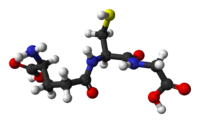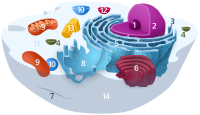
Dynamical behaviors of oscillating metallosurfactant coacervate microdroplets under redox stress.
Sign Up to like & getrecommendations! Published in 2023 at "Advanced materials"
DOI: 10.1002/adma.202210700
Abstract: Living systems create complex structures and functions by mastering self-organization in a variety of equilibrium and nonequilibrium states. Mimicking the dynamical phenomena with synthetic cell-like entities (protocell) under nonequilibrium conditions offers an important step towards… read more here.
Keywords: metallosurfactant coacervate; redox stress; oscillating metallosurfactant; behaviors oscillating ... See more keywords

Characterization of nitroso-redox stress induced cancer cell death
Sign Up to like & getrecommendations! Published in 2018 at "Free Radical Biology and Medicine"
DOI: 10.1016/j.freeradbiomed.2018.04.322
Abstract: There are ongoing efforts to develop nitric oxide (NO) or S-nitrosothiol (SNO) donors as anticancer agents. Yet, tumor cell defense mechanisms pose a significant problem. We found that treatment of HeLa cancer cells with l-buthionine-sulfoximine… read more here.
Keywords: death; cell death; cancer; cell ... See more keywords

Hypericum perforatum L. Regulates Glutathione Redox Stress and Normalizes Ggt1/Anpep Signaling to Alleviate OVX-Induced Kidney Dysfunction
Sign Up to like & getrecommendations! Published in 2021 at "Frontiers in Pharmacology"
DOI: 10.3389/fphar.2021.628651
Abstract: Menopause and associated renal complications are linked to systemic redox stress, and the causal factors remain unclear. As the role of Hypericum perforatum L. (HPL) in menopause-induced kidney disease therapy is still ambiguous, we aim… read more here.
Keywords: induced kidney; glutathione redox; redox; ovx induced ... See more keywords

Mitochondrial Generated Redox Stress Differently Affects the Endoplasmic Reticulum of Circulating Lymphocytes and Monocytes in Treatment-Naïve Hodgkin’s Lymphoma
Sign Up to like & getrecommendations! Published in 2022 at "Antioxidants"
DOI: 10.3390/antiox11040762
Abstract: Background. The redox stress caused by Hodgkin’s lymphoma (HL) also involves the peripheral blood mononucleated cells (PBMCs) even before chemotherapy. Here, we tested whether lymphocytes and monocytes show a different response to the increased mitochondrial… read more here.
Keywords: endoplasmic reticulum; redox stress; stress; hodgkin lymphoma ... See more keywords

18F-Fluorodeoxyglucose Positron Emission Tomography Tracks the Heterogeneous Brain Susceptibility to the Hyperglycemia-Related Redox Stress
Sign Up to like & getrecommendations! Published in 2020 at "International Journal of Molecular Sciences"
DOI: 10.3390/ijms21218154
Abstract: In cognitively normal patients, mild hyperglycemia selectively decreases 18F-Fluorodeoxyglucose (FDG) uptake in the posterior brain, reproducing Alzheimer disease pattern, hampering the diagnostic accuracy of this widely used tool. This phenomenon might involve either a heterogeneous… read more here.
Keywords: brain; hyperglycemia related; related redox; redox stress ... See more keywords